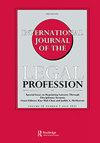“A little more complex”: pro bono commitment in São Paulo corporate law firms
IF 0.9
Q2 LAW
International Journal of the Legal Profession
Pub Date : 2020-06-16
DOI:10.1080/09695958.2020.1775602
引用次数: 0
Abstract
ABSTRACT Pro bono's development in São Paulo, Brazil, has been a conflictive process, resisted by multiple segments in the legal profession. In 2001, this conflict led the São Paulo State Bar to impose regulatory restrictions on pro bono practice. One of these restrictions involved pro bono services to individuals, which firms or any other practitioner were explicitly prohibited from delivering. In 2015, this changed radically. The bar removed most of its restrictions to pro bono. Many expected that this would cause firms to further their commitment to pro bono and, more specifically, to start offering free legal services to needy individuals. This expectation, however, was not met. In the absence of regulatory restrictions, what explains the decision by São Paulo corporate law firms of whether or not to engage in the provision of individual pro bono services? Based on multiple data sources and a multi-staged empirical research process, this article points to a set of institutional forces and cognitive frames that have shaped the development of pro bono in such firms post-2015. These include law firm organizational rationality, “turf wars” over legal aid work, and lawyers' professional idealism.“稍微复杂一点”:圣保罗公司律师事务所的无偿服务承诺
摘要公益组织在巴西圣保罗的发展经历了一个矛盾的过程,受到了法律界多个阶层的抵制。2001年,这场冲突导致圣保罗州律师协会对公益行为施加监管限制。其中一项限制涉及向个人提供无偿服务,明确禁止公司或任何其他从业者提供此类服务。2015年,情况发生了根本性变化。酒吧取消了对无偿服务的大部分限制。许多人预计,这将促使公司进一步致力于无偿服务,更具体地说,开始向有需要的个人提供免费法律服务。然而,这一期望没有得到满足。在没有监管限制的情况下,圣保罗公司律师事务所决定是否参与提供个人无偿服务的原因是什么?基于多个数据来源和多阶段的实证研究过程,本文指出了一系列制度力量和认知框架,这些力量和框架塑造了2015年后此类企业公益事业的发展。其中包括律师事务所的组织理性、法律援助工作的“地盘之争”以及律师的职业理想主义。
本文章由计算机程序翻译,如有差异,请以英文原文为准。
求助全文
约1分钟内获得全文
求助全文

 求助内容:
求助内容: 应助结果提醒方式:
应助结果提醒方式:


